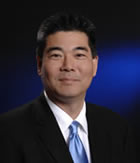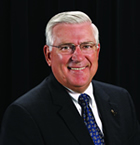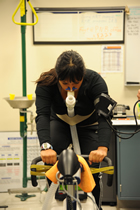

The UTSA Office of the Provost announced that Academic Affairs has appointed the Department of Educational Leadership and Policy Studies’ Dr. Alan Shoho as associate vice provost for academic and faculty support.
In his new role as associate vice provost, Shoho will help facilitate the implementation and review of all faculty support programs. Among his current projects are a university-wide mentoring/ coaching program, a faculty recognition program, and programming for the anticipated Faculty Center in the John Peace Library. Also, he will support initiatives related to the Downtown Campus.

In the spring of 2013, The University of Texas at San Antonio announced the selection of Donovan Fogt, associate professor in the Department of Kinesiology, Health, and Nutrition to serve as director of the Office of Undergraduate Research. The newly created office promotes the visibility and breadth of research opportunities for undergraduate students in all academic disciplines.
As director of the Office of Undergraduate Research, Fogt will:
“Dr. Fogt has an outstanding reputation for excellence in teaching and research,” said Bernard Arulanandam, assistant vice president for research support. “I have every expectation that he will expand and enhance our existing undergraduate research program to help UTSA achieve its Tier One aspirations.”

On November 4, 2013, Northside Independent School District dedicated Folks Middle School to Dr. John M. Folks, senior lecturer in The University of Texas at San Antonio’s College of Education and Human Development.
Folks served as superintendent of Northside Independent School District (NISD) for ten years before joining the College of Education and Human Development as a senior lecturer in the Department of Educational Leadership and Policy Studies.
Prior to his tenure as NISD’s superintendent, Folks served as dean of the School of Education at Southwestern Oklahoma State University and as superintendent for Oklahoma State, Midwest City–Del City Public Schools, and Spring Independent School District. Folks Middle School opened in 2013 and is one of 20 middle schools in NISD, the largest school district in the San Antonio metropolitan area.

Throughout 2013, COEHD kinesiology professor Meizi He, M.D., Ph.D. and her team have been working with two local churches to implement an obesity prevention program targeting Latinos. In the spring of 2013, Dr. He and her team trained approximately 50 local church leaders to expand the program to eight additional churches on San Antonio’s South Side.
Dr. He’s program, Building a Healthy Temple, is a faith-based program that promotes healthy eating, active living and healthy body weight. It is funded in part by the Baptist Health Foundation.
Church leaders, lay leaders, and church volunteers participate in the program, and the participants collaborate to share best practices between congregations. Some of the training that took place were break-out sessions to train participants on the components of the program: health sermons, Bible study, Sunday School, nutrition education and cooking demonstrations, and physical activity.
“We have piloted Building a Healthy Temple in San Antonio for two years, and it has been embraced by church leaders and church-goers,” said Dr. He. “Our pilot studies have shown that many of the participants have adopted more active lifestyles. It’s really exciting to have the support of the Baptist Health Foundation, so we can expand the program to reach more people here in San Antonio.”

The documentary film Stolen Education made its San Antonio debut on Sept.19, 2013, at the UTSA Downtown Campus’ Buena Vista Theater. The film, which was shown to more than 300 people, tells the story of a group of Mexican American elementary school students who testified in one of the first federal desegregation cases in Texas.
The Center for Accelerated Schools (CAS) came to the College of Education and Human Development (COEHD) in the fall of 2012 after being housed at The University of Texas at Austin for 16 years. The center engages the community, administrators, staff, teachers, parents, and students in creating the best schools for all students. In 2013, the center worked to help take Texas schools and teachers to the next level.
“Our long history of success is directly connected to our diverse staff of highly dedicated and talented educators who value a system of continuous improvement that permeates every aspect of our work.” said Joan Vasbinder, director of CAS. “Our work is exciting, challenging and inspiring, as we support educators in identifying ways to increase student outcomes.”
During this past year the center was a co-sponsor with The Center for Educational Leadership, Policy and Professional Development to put on a series of Superintendents' Luncheons which focused on topics such as leadership, school finance, curriculum and instruction, and high stakes testing. CAS has participated in the COEHD's Superintendents' Symposiums, as well as sponsoring and collaborating with colleagues from the Counseling and Educational Psychology Departments to host "Principals, Counselors, and School Psychologists: Collaborating for Student Success," a joint event for students in the program's internship classes.
CAS also Collaborated with Dr. Maria Arreguin-Anderson's ECE 6363 class; Differentiated Instruction in a Diverse Classroom. Based on their course outline, CAS staff presented professional development experiences in "Understanding Teaching and Learning Styles through True Colors" and "Powerful Learning in the Differentiated Classroom". Students were engaged in authentic hands-on, minds-on, activities that were taken immediately back to the classrooms or course work for implementation.

In the spring of 2013, College of Education and Human Development’s William Cooke and Donovan Fogt received $30,000 in seed funding from UTSA to find out just how safe electronic cigarettes (e-cigarettes) are. The UTSA kinesiologists will team up with Assistant Professor Caroline Rickards at the University of North Texas Health Science Center to gather baseline data about the effects of e-cigarettes on the body’s basic physiological health. For six years, e-cigarettes have been aggressively marketed as an alternative for smokers who want to decrease the risk of the serious health problems associated with conventional cigarette smoking. Instead of inhaling a cigarette’s nicotine and carbon monoxide, e-cigarette users inhale vaporized pure nicotine. But, very little research has been done about the effects of inhaling vaporized nicotine.
Through 2014, the researchers will study the effects that inhaling vaporized nicotine has on a person’s heart rate, blood pressure, resting metabolic rate, physical work capacity, and brain blood flow.
UTSA students pursuing kinesiology and health-related careers will conduct research alongside the scholars, giving them the opportunity to learn quantitative research methods in preparation for their careers in academia and health-related professions.
The scholars will work under the hypothesis that vaporized nicotine stimulates the human nervous system in ways that could seriously impact daily living. They believe that the inhalation of vaporized nicotine has the potential to increase a person’s resting metabolism, making exercise problematic. They also believe it prevents the cardiovascular system from properly regulating arterial pressure and decreases the brain’s ability to regulate blood flow.
“E-cigarettes are perceived as safer than actual smoking, and some people even perceive them to be an attractive weight-loss tool,” said Fogt. “This study aims to quantify the metabolic consequences of inhaling vaporized nicotine.”
Cooke added, “This study is an important first step to understanding the physiological complications and public health concerns surrounding the use of e-cigarettes. It will also give us a better understanding of the health effects of pure nicotine without the harmful poisons found in tobacco products on the autonomic nervous system.”
If this study confirms the scholars’ hypotheses, additional research will be needed to further understand the immediate effects of vaporized nicotine, the impact of dosage and age on an e-cigarette user’s health and the long-term effects of e-cigarettes.
The UTSA Department of Kinesiology, Health, and Nutrition serves more than 1,000 students in four undergraduate degree programs, a minor and a master’s program. Its faculty specializes in community health, school health, nutrition, exercise physiology, exercise and sport psychology, pedagogy, adaptive/ developmental physical education, biomechanics, motor learning and control, and evaluation and assessment. Research conducted in the department focuses on the prevention and treatment of risks for diseases and promotion of healthy growth and living across lifespan.

The National Association for Bilingual Education (NABE) history can now be found at The University of Texas at San Antonio (UTSA), where it was partially rooted.
Albar A. Peña, former UTSA faculty member and the first director of the UTSA Department of Bicultural-Bilingual Studies, helped start the association and became its first president in 1975. Now, nearly four decades later, the association’s records are being preserved at the university.
NABE has donated 61 boxes of correspondence, administrative files, legislative lobbying documents, audio-visual materials, photographs and conference records to the UTSA Libraries. The association is an advocate for bilingual and English language learners and cultivates a multilingual, multicultural society by supporting and promoting policy, programs, pedagogy, research and professional development.
The collection constitutes 43 years of history that represent the work many individuals have carried out to advance bilingual education in the U.S., said Rossana Ramirez Boyd, immediate past president and current member of NABE.
“We are pleased to know the UTSA Libraries will make the information available to the public,” she said. “This is particularly important to the new generation of scholars and policy makers who have been searching for NABE’s history to write their theses, dissertations, and articles on bilingual education.”
Belinda Bustos Flores, professor and chair of the UTSA Department of Bicultural- Bilingual Studies, helped facilitate the acquisition.
“There are historical roots and reasons for UTSA having the NABE archives,” said Flores. “Albar Peña had a long history of activism and vision for bilingual education. His professional records alone consist of 16.2 feet of archival materials spanning more than 40 years, during which he served Texas and the nation in high-level positions of advocacy for bilingualism and biculturalism. We are thrilled to have this legacy available at UTSA.”
NABE was looking for a location with a reputation of strong collections and services that included organizing and making the collection available for research, while providing onsite and remote reference services.
“With Bicultural-Bilingual Studies as one of the founding academic units at UTSA, bilingual education has a long history at the university,” said Nikki Thomas, manuscripts curator at UTSA Libraries. “Special Collections is pleased to add the records of NABE to our holdings where they will complement both manuscript and university archives collections.”